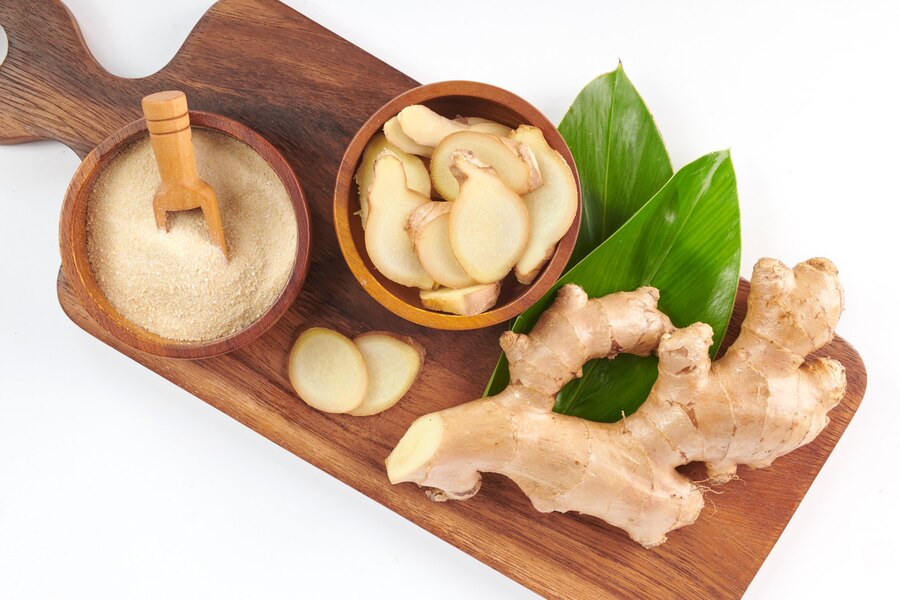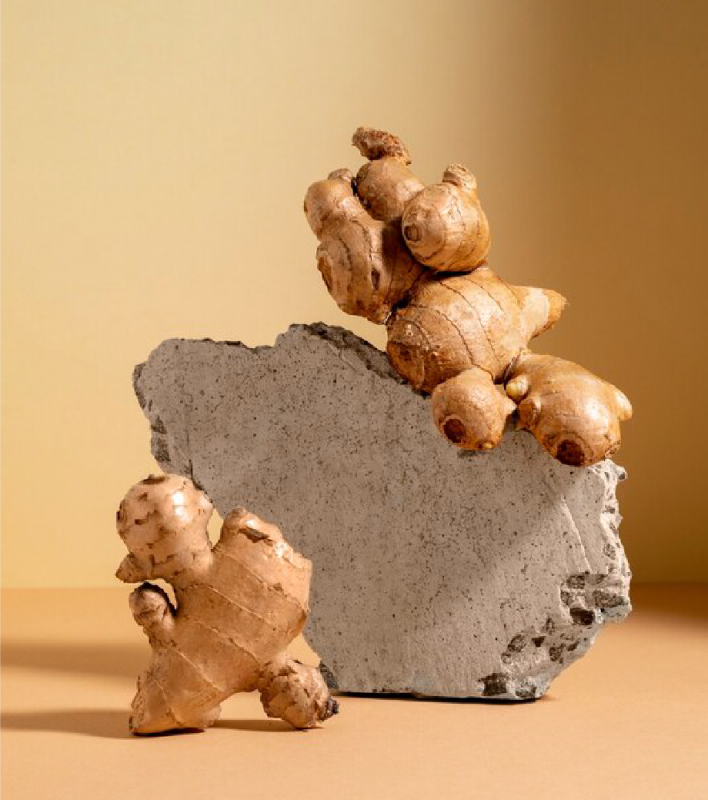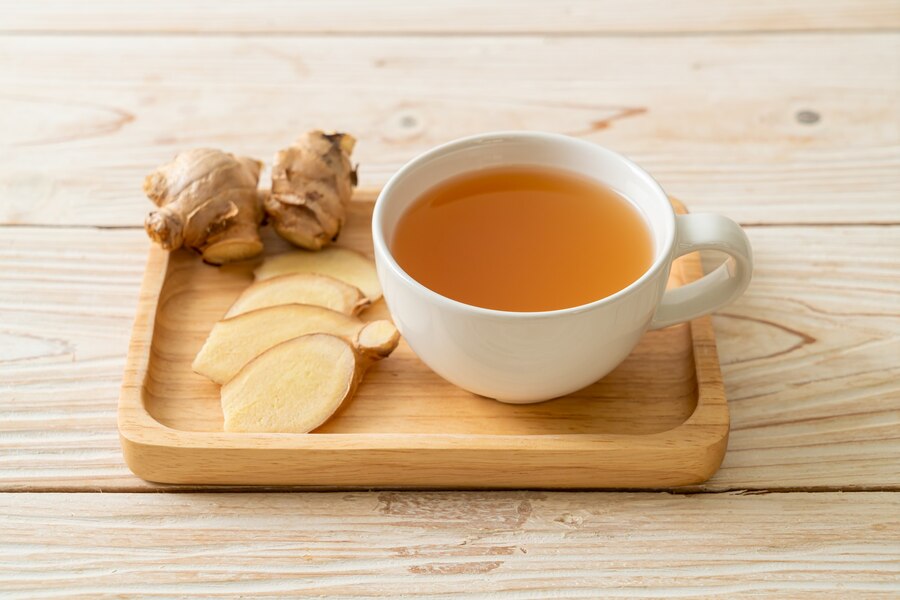Ginger is a herb whose root is used as a medicinal plant. This plant can be used dry or fresh. If you don’t mind its spicy taste, you can use it as a spice in cooking all kinds of food.
The rhizome (the underground part of the stem) is the part that is usually used as a spice. It is often called ginger root.
You can use ginger fresh, dried, powdered or as oil or juice. It is found in many recipes as well as processed foods, home remedies and cosmetics.

Use of ginger
Ginger is used in numerous forms, including fresh, dried, pickled, preserved, crystallized, candied, and powdered or ground. The flavor is somewhat peppery and slightly sweet, with a strong and spicy aroma.
The most important properties
- Anti-inflammatory properties

- disinfection
- Antioxidant
- anti nausea
- Anti-inflammation of the joints
- Increase the immune system
- Improve digestion
- To treat all types of cancer
- for infection
- seasonal allergy
- for a cold
- For facial skin
- To treat dandruff
- For fatty liver
- For the stomach
- Can help with osteoarthritis
- It lowers blood sugar
- May help lower cholesterol levels
- May improve brain function and protect against Alzheimer’s disease Can help fight infections
The difference between ginger root and its powder
Both forms contain all the health benefits of ginger. Though it’s hard to beat the flavor of the fresh root, ginger powder is nutritious, convenient and economical.
Fresh ginger lasts a while in the refrigerator and can be frozen after you have peeled and chopped it. The powder has a long shelf life and is ready to use without peeling and chopping.
Those who should not eat ginger
- Do not use in children under two years of age.
- Consuming too much of it causes heartache.
- People with kidney stones should consult their doctor before use.
- If you are taking blood thinners such as warfarin and aspirin, do not eat ginger.
- Excessive consumption of ginger may interfere with heart and diabetes medications.
- Its consumption during pregnancy and breastfeeding should be moderate.
- Its high consumption may cause disturbances in the central nervous system.
Complications
- Skin sensitivity: Some may experience skin sensitivity such as allergies, redness, itching and skin irritation to this plant.
- Digestive problems: consumption of this plant causes digestive problems such as indigestion, heartburn and intestinal gases in some people.
- Interaction with drugs: This plant interacts with some drugs and changes their effects. For example, ginger may increase the antiplatelet effect of the blood and interact with medications such as warfarin.
- Uterine muscle stimulation: Some sources have shown that ginger consumption during pregnancy may increase uterine muscle stimulation.

Ginger tea
One of the best ways to benefit from the properties of ginger is to use it as an infusion or tea.
Types of ginger tea
- Regular ginger tea
- Ginger tea with milk
- Cold ginger tea
Properties of ginger tea
Tea made from ginger has high levels of vitamin C and amino acids as well as various elements such as calcium, zinc, sodium, phosphorus and many other useful elements.
Nutritional value table =
|
The main constituent |
Amount per 100 grams |
|
Energy (calories) |
80 kcal |
|
carbohydrate |
17.77 grams |
|
Protein |
1.82 grams |
|
fat |
0.75 grams |
|
Water |
78.89 grams |
|
fiber |
2.00 grams |
|
sugar Loaf |
1.70 grams |
|
Cholesterol |
0.00 mg |
|
vitamins |
|
|
The name of the vitamin |
Amount per 100 grams |
|
Vitamin A |
0.00 µg |
|
Vitamin D |
0.00 µg |
|
Vitamin E |
0.26 mg |
|
Vitamin K |
0.10 micrograms |
|
Vitamin C |
5.00 mg |
|
Thiamine (B1) |
0.03 mg |
|
Riboflavin (B2) |
0.03 mg |
|
Niacin (B3) |
0.75 mg |
|
Choline (B4) |
28.80 mg |
|
pantothenic acid (B5) |
0.20 mg |
|
Vitamin B6 |
0.16 mg |
|
Folate (B9) |
11.00 micrograms |
|
Vitamin B12 |
0.00 mg |
|
Minerals |
|
|
The name of the mineral |
Amount per 100 grams |
|
Calcium |
16.00 mg |
|
iron |
0.60 mg |
|
magnesium |
43.00 mg |
|
phosphorus |
34.00 mg |
|
potassium |
415.00 mg |
|
sodium |
13.00 mg |
|
Roy |
0.34 mg |
|
copper |
0.23 mg |
|
Manganese |
0.23 mg |
|
selenium |
0.70 micrograms |
The products we offer are:
Kaleghochi kernel : link
Peppermint : link
Tomato Paste : link
Barberry B Grade : link









We’re a group of volunteers and opening a new scheme in our community. Your website offered us with valuable information to work on. You’ve done an impressive job and our whole community will be grateful to you.
he blog was how do i say it… relevant, finally something that helped me. Thanks
I am commenting to make you be aware of what a fine experience my wife’s girl had using your webblog. She came to understand too many details, including how it is like to possess an awesome coaching spirit to make other individuals really easily comprehend specific hard to do subject areas. You actually did more than readers’ desires. Thank you for offering those priceless, safe, edifying and even fun tips on your topic to Janet.
Can you be more specific about the content of your article? After reading it, I still have some doubts. Hope you can help me.